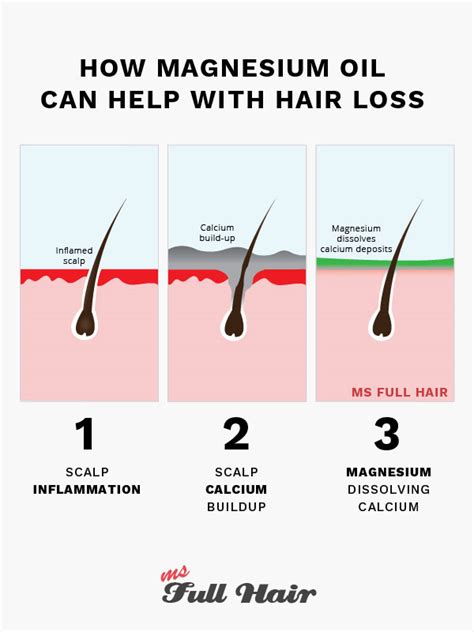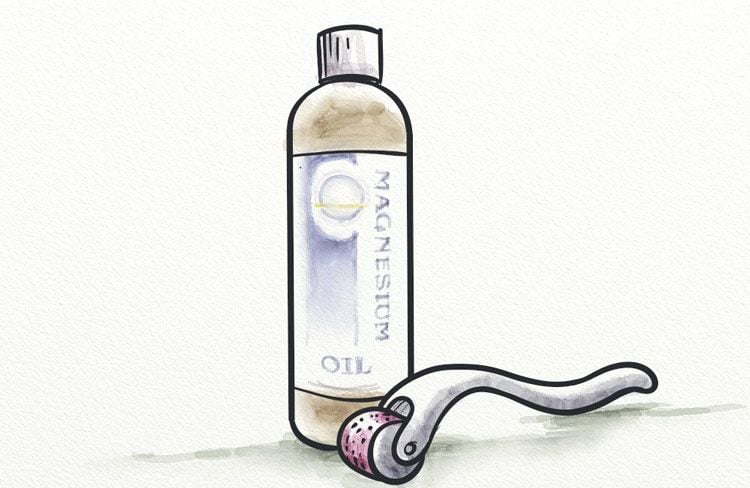Deleted member 10172
CEO of Cope
- Joined
- Oct 10, 2020
- Posts
- 8,501
- Reputation
- 11,812
Magnesium oil has been used by many in an attempt to counteract hair loss. However, there have been no objective studies to measure the effects of magnesium oil on hair growth.
Nonetheless, magnesium is a critical nutrient that plays a role in many cell functions. So, despite the lack of studies, magnesium could indeed play a role in hair growth.
Below is a list of ways magnesium might contribute to hair growth.
Reduces Scalp Calcification
One of the most common forms of hair loss that plagues both men and women is Androgenetic Alopecia (AGA). Dihydrotestosterone (DHT), an enzymatic product of testosterone and the 5α-reductase (5α-R) enzyme, mediates this hair loss (2).
This is because DHT is known to stimulate the activity of a growth factor called TGF-β. This growth factor contributes to the calcification of blood vessels and scarring around the hair follicle that culminates as hair follicle miniaturization.
This miniaturization appears as hair loss on the scalp.
Calcification of the blood vessels on the scalp, or scalp calcification, is a complex process. TGF-β triggers a cascade of events that lead to calcium deposits in the blood vessels. As a result, blood flow is restricted and nutrient supply is decreased to the hair follicle.


Because nutrients like protein, vitamins, and minerals are crucial for hair growth, an impaired blood supply can be extremely detrimental.
Magnesium may help counteract this calcification. Various studies have demonstrated the ability of magnesium to reduce vascular calcification (3). Magnesium deficiency is also associated with vascular calcification (4).
There are many ways that magnesium may accomplish this, however, the mechanisms are still yet to be confirmed.
Magnesium oil use may provide the magnesium needed to help counteract vascular calcification, including on the scalp.
Fluroide causes you to lose more iodine and iodine serves a lot of function for the thyroid which regulates the endocrine system.
For all looksmaxxers invest into a shower filter NOW.
Regulates Vitamin D
One of the other important roles magnesium plays is promoting vitamin D synthesis (6).
Vitamin D is intricately involved in hair growth (7). It has been suspected to regulate hair cycling, support hair follicle health, and may be involved in stimulating the growth phase of the hair cycle.
It also helps regulate the immune system to prevent autoimmunity. As it relates to hair, Alopecia Areata (AA; an autoimmune disease that results in hair loss) has been strongly linked to diminished vitamin D activity.
In one study of mice fed a magnesium-deficient diet, researchers found that the rats had a significant increase in 24-hydroxylase and a decrease in 1α-hydroxylase.
The 24-hydroxylase enzyme is responsible for degrading vitamin D and inactivating it. In essence, higher levels of 24-hydroxylase mean less active vitamin D.
Coupled with a decrease in 1α-hydroxylase, the enzyme that makes vitamin D biologically active, this puts a serious hamper on vitamin D activity.
Considering vitamin D activity is assumed to be essential for hair growth and possibly preventing AA, supporting vitamin D activity with magnesium is seemingly prudent.
Although there are other factors that can affect vitamin D activity, it’s undeniable that magnesium plays a role.
May Reduce Scalp Tension
Scalp tension is believed to be one of the culprits behind AGA (2). Proponents of this theory suggest that chronic tension of the scalp muscles is the trigger for the downstream effects that lead to AGA progression.
There is a good amount of evidence to support this theory. What is less clear, though, is what causes the chronic scalp tension in the first place.
Magnesium deficiency may contribute to muscle tension (18). With its calcium-blocking properties, magnesium counteracts the muscle tension that results from increased cellular calcium.
Due to these muscle relaxing properties, magnesium oil may help reduce scalp tension that theoretically leads to hair loss. But, again, this hasn’t been directly tested.
A video about Magnesium and Hair:
Magnesium Will Tell You It Is Working in Your Eyebrows First
Your eyebrows, however, grow a lot faster, completing their life cycle in just 3 to 4 months.
If you use magnesium oil on your eyebrows for six months, you have good reason to believe that you can see results of magnesium oil treatment on your scalp over a year or two.
Think of magnesium oil as a kind of fertilizer for healthy hair.
Just as your lawn needs fertilizer throughout its growing season, your hair needs magnesium oil as long as it is growing. It takes a while for a sick lawn to look healthy, even when you are doing all the right things.
Likewise, it takes a while for magnesium oil to play its role in revitalizing your hair even though you need to use it several times a week.
Magnesium has a few key roles when it comes to healthy hair growth.
Preventing Calcium Buildup

First, magnesium helps prevent calcium buildup on your scalp. When calcium clogs hair follicles, your scalp will be dry, flaky, and you could even see some hair loss. These calcium deposits on and around the hair follicles can increase over time due to scalp inflammation.
Magnesium counteracts with calcium, improving circulation and making sure calcium gets to your bones where it’s needed, rather than clogging up on the surface of your scalp. Better circulation also means that other nutrients from your diet are getting to your follicles.
Protein Synthesis
Second, magnesium helps with protein synthesis. Since hair follicles are made almost entirely of protein, this is key. Better protein synthesis means healthier hair and a predictable hair cycle with normal growing and resting stages. Protein synthesis also helps create melanin, which helps prevent your hair from going gray.
Low effort research thread but u get the point.Why spend so much effort on something for someone to say it is cope JFL
some sites about magnesium oil:
 www.stylecraze.com
www.stylecraze.com

 magnesiumandhealth.com
magnesiumandhealth.com

 howtocure.com
howtocure.com

 www.hairguard.com
www.hairguard.com
Nonetheless, magnesium is a critical nutrient that plays a role in many cell functions. So, despite the lack of studies, magnesium could indeed play a role in hair growth.
Below is a list of ways magnesium might contribute to hair growth.
Reduces Scalp Calcification
One of the most common forms of hair loss that plagues both men and women is Androgenetic Alopecia (AGA). Dihydrotestosterone (DHT), an enzymatic product of testosterone and the 5α-reductase (5α-R) enzyme, mediates this hair loss (2).
This is because DHT is known to stimulate the activity of a growth factor called TGF-β. This growth factor contributes to the calcification of blood vessels and scarring around the hair follicle that culminates as hair follicle miniaturization.
This miniaturization appears as hair loss on the scalp.
Calcification of the blood vessels on the scalp, or scalp calcification, is a complex process. TGF-β triggers a cascade of events that lead to calcium deposits in the blood vessels. As a result, blood flow is restricted and nutrient supply is decreased to the hair follicle.

Because nutrients like protein, vitamins, and minerals are crucial for hair growth, an impaired blood supply can be extremely detrimental.
Magnesium may help counteract this calcification. Various studies have demonstrated the ability of magnesium to reduce vascular calcification (3). Magnesium deficiency is also associated with vascular calcification (4).
There are many ways that magnesium may accomplish this, however, the mechanisms are still yet to be confirmed.
Magnesium oil use may provide the magnesium needed to help counteract vascular calcification, including on the scalp.
This makes sense because the Jews are putting fluoride and calcium in the water which is also known as "hard water".In short-terms:
- DHT contributes to scalp calcification which is a hallmark of AGA. This calcification of the blood vessels contributes to follicle miniaturization and hair loss.
- Magnesium has been shown to counteract this calcification. Magnesium deficiencies have also been associated with vascular calcification.
- The mechanisms of magnesium’s anti-calcification properties are still yet to be confirmed.
- Magnesium oil may provide the body with the magnesium it needs to counteract this calcification.
Fluroide causes you to lose more iodine and iodine serves a lot of function for the thyroid which regulates the endocrine system.
For all looksmaxxers invest into a shower filter NOW.
Regulates Vitamin D
One of the other important roles magnesium plays is promoting vitamin D synthesis (6).
Vitamin D is intricately involved in hair growth (7). It has been suspected to regulate hair cycling, support hair follicle health, and may be involved in stimulating the growth phase of the hair cycle.
It also helps regulate the immune system to prevent autoimmunity. As it relates to hair, Alopecia Areata (AA; an autoimmune disease that results in hair loss) has been strongly linked to diminished vitamin D activity.
In one study of mice fed a magnesium-deficient diet, researchers found that the rats had a significant increase in 24-hydroxylase and a decrease in 1α-hydroxylase.
The 24-hydroxylase enzyme is responsible for degrading vitamin D and inactivating it. In essence, higher levels of 24-hydroxylase mean less active vitamin D.
Coupled with a decrease in 1α-hydroxylase, the enzyme that makes vitamin D biologically active, this puts a serious hamper on vitamin D activity.
Considering vitamin D activity is assumed to be essential for hair growth and possibly preventing AA, supporting vitamin D activity with magnesium is seemingly prudent.
Although there are other factors that can affect vitamin D activity, it’s undeniable that magnesium plays a role.
Key Takeaways:
- Vitamin D is intricately involved with hair growth and diminished vitamin D activity is associated with the development of AA.
- Rats fed a magnesium-deficient diet have increased levels of 24-hydroxylase and decreased levels of 1α-hydroxylase. Together, this puts a serious hamper on vitamin D activity.
- Considering the role vitamin D plays in hair growth and alopeciaareata, supporting vitamin D activity with magnesium is seemingly prudent.
May Reduce Scalp Tension
Scalp tension is believed to be one of the culprits behind AGA (2). Proponents of this theory suggest that chronic tension of the scalp muscles is the trigger for the downstream effects that lead to AGA progression.
There is a good amount of evidence to support this theory. What is less clear, though, is what causes the chronic scalp tension in the first place.
Magnesium deficiency may contribute to muscle tension (18). With its calcium-blocking properties, magnesium counteracts the muscle tension that results from increased cellular calcium.
Due to these muscle relaxing properties, magnesium oil may help reduce scalp tension that theoretically leads to hair loss. But, again, this hasn’t been directly tested.
Key Takeaways:
- Scalp tension is believed to be one of the culprits behind AGA. In theory, it triggers downstream effects that lead to AGA progression.
- It’s not clear what causes chronic scalp tension, but magnesium may help. Magnesium blocks calcium influx to muscle cells that causes contraction.
- Due to these muscle relaxing properties, magnesium oil may help reduce scalp tension that theoretically leads to hair loss.
A video about Magnesium and Hair:
Magnesium Will Tell You It Is Working in Your Eyebrows First
Your eyebrows, however, grow a lot faster, completing their life cycle in just 3 to 4 months.
If you use magnesium oil on your eyebrows for six months, you have good reason to believe that you can see results of magnesium oil treatment on your scalp over a year or two.
Think of magnesium oil as a kind of fertilizer for healthy hair.
Just as your lawn needs fertilizer throughout its growing season, your hair needs magnesium oil as long as it is growing. It takes a while for a sick lawn to look healthy, even when you are doing all the right things.
Likewise, it takes a while for magnesium oil to play its role in revitalizing your hair even though you need to use it several times a week.
Magnesium has a few key roles when it comes to healthy hair growth.
Preventing Calcium Buildup

First, magnesium helps prevent calcium buildup on your scalp. When calcium clogs hair follicles, your scalp will be dry, flaky, and you could even see some hair loss. These calcium deposits on and around the hair follicles can increase over time due to scalp inflammation.
Magnesium counteracts with calcium, improving circulation and making sure calcium gets to your bones where it’s needed, rather than clogging up on the surface of your scalp. Better circulation also means that other nutrients from your diet are getting to your follicles.
Protein Synthesis
Second, magnesium helps with protein synthesis. Since hair follicles are made almost entirely of protein, this is key. Better protein synthesis means healthier hair and a predictable hair cycle with normal growing and resting stages. Protein synthesis also helps create melanin, which helps prevent your hair from going gray.
Low effort research thread but u get the point.Why spend so much effort on something for someone to say it is cope JFL
some sites about magnesium oil:
8 Benefits Of Magnesium Oil, How To Use It, & Side Effects
From inducing hair growth and providing relief from cramps to treating anxiety and depression symptoms, here are the 7 amazing benefits of magnesium oil.

Magnesium and Hair Loss - your general health - Magnesium and Health
I first noticed that my lovely hair was thinning when I was in my forties. Magnesium and hair loss tells of my life coping with thinning hair.
 magnesiumandhealth.com
magnesiumandhealth.com

Methods of Using Magnesium Oil For Hair Growth
In today's world, we notice every second person having problems like losing hair, having hair fall without any specific reason, and also baldness and greying hair are the common issues these days. The reason for these problems at an early age is not getting real things to eat. It can also be the...
 howtocure.com
howtocure.com

Magnesium Oil for Hair Loss: 12 Week Results - Hairguard
In this article I’ll show you exactly how to use magnesium oil for hair loss, in a way you’ve probably never heard about before – but could have a powerful effect on hair growth. I’ll discuss the benefits of using it, why and how it works, and how to use it in a homemade shampoo ... Read...

